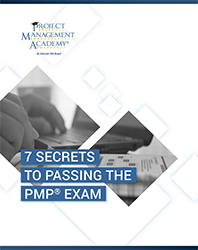
Many people wonder if they qualify for the PMP certification. To answer this question, always focus on whether you were working to create something new, be it a product, service, process, system, etc. If the answer is yes, it will almost certainly qualify. Disregard your job title completely - your role is what matters. In addition, you will need to examine the type of work you have done, the number of hours, and the overall duration of your work experience. This article examines the requirements for you in more detail, so you can be sure that you are qualified to receive the PMP certification.

7 Secrets to Passing the PMP Exam
Learn the secrets to passing the PMP® exam on your first try.
What types of work qualify?

These audits are fairly simple. First, you must provide evidence of your educational background, and you can simply copy your diploma and send that in. Next, someone you worked with on each project you listed must sign a form saying that you have accurately described your work. Finally, you must show that you received the 35 hours of professional development required to sit for the exam (the Project Management Academy® PMP exam prep course satisfies this requirement, so you would just send a copy of your certificate).
If you provide this information and the work is deemed to be project related, then the audit ends very quickly and you can go on to sit for the exam. While only PMI can speak to its methods, experience shows that perhaps 5% of applicants will be audited, and their selection is purely random.
How much work experience must I have to get my PMP certification?
If you have a four-year college degree, then you will need to show that you have spent at least 4,500 hours working on projects, and that your project work took place over at least a three-year period. So there are two separate requirements: volume of work (4,500 hours) and duration spent working in that realm (3 calendar years).
Let's look at an example to see how this plays out. Assume you worked on one big project for 4,500 hours, but you worked really hard and all the work was done in two years. Here you would not qualify, because while you satisfied the volume requirement, you did not satisfy the time requirement. Had you worked on another project for another full year, even if you devoted very little time to it, then you could use that extra year to meet the overall time requirement.
Assume now that you worked those 4,500 hours on the project, but that it lasted three full years and you were involved in it the whole time. Now you have satisfied both the volume and duration requirements. Keep in mind these requirements are distinct; you may go well over the 4,500 hours but still not meet the duration requirement if those hours were not spread over a three-year period.
For example, assume you worked on two projects at the same time, over a two-year period. You worked very hard, racking up 5,000 hours on the two projects over that timeframe. You spent 3,000 hours on Project A and 2,000 hours on Project B. Both projects will be considered for purposes of meeting the volume (hours) requirement. However, since you were working on them both over the same time period, only one of them will count for purposes of satisfying the duration (three year) requirement.

If you have something less than a four-year college degree (i.e. high school diploma or associates degree), you can still get your PMP certification, but the requirements increase. Here you would have to show five years of overall project work experience, as well as 7,500 hours for the volume requirement. All other requirements are the same; the numbers just increase for the work experience.
You also must show that, over the course of your experience, you have worked in some fashion on each of the five process groups: Initiating, Planning, Executing, Monitoring and Controlling, and Closing. You need not have touched on all these areas for every project, nor is there an hourly requirement for each specific process group. But in the aggregate, you must document some hours falling within each of these process groups over the course of your overall experience.
One final note on the experience requirement: PMI will not consider work experience you obtained more than 8 years before the date of your application. This cutoff sometimes wreaks havoc for people who worked on projects in the distant past, but have not done much recently. So make sure that you can meet the requirements using only experience obtained in the last 8 years.
Next Steps
When asking yourself whether your work experience will count for the PMP exam application, always focus on whether you were working to create something new - be it a product, service, process, system, etc. - as well as the project's total hours and durations.
If you don't think you qualify, there is still a way to distinguish yourself before PMP certification. Aspiring project managers should consider earning their Certified Associate in Project Management (CAPM)® Certification. Find out more here.
If you do think you qualify, the PMP certification remains a must-have for any serious project manager, opening the door to increased salary and better job opportunities. Let Project Management Academy® help you take the next step in your career. Call or go online to sign up for the next PMP exam prep boot camp in your area.

 New Horizons
New Horizons
 Project Management Academy
Project Management Academy
 Six Sigma Online
Six Sigma Online
 TCM Security
TCM Security
 TRACOM
TRACOM
 Velopi
Velopi
 Watermark Learning
Watermark Learning
 Login
Login





 New Horizons
New Horizons
 Project Management Academy
Project Management Academy
 Velopi
Velopi
 Six Sigma Online
Six Sigma Online
 TCM Security
TCM Security
 TRACOM
TRACOM
 Watermark Learning
Watermark Learning